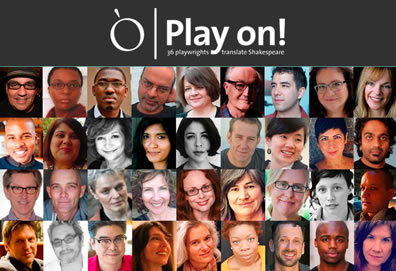Oregon Shakespeare Festival Translation Project
Chill, People

The Oregon Shakespeare Festival's Allen Elizabethan Theatre set for OSF's 2013 production of William Shakespeare's A Midsummer Night's Dream. Photo by T. Charles Erickson, Oregon Shakespeare Festival.
The current trend among Shakespeare theaters and festivals is to complete the canon. Having produced all 37 William Shakespeare plays (those in the First Folio plus Pericles), or 38 (plus Two Noble Kinsmen), or 39 (plus Edward III), or even 40 (plus Double Falsehood, though I think Arden of Faversham is more deserving) has been celebrated in the past few years at Atlanta's Shakespeare Tavern in Georgia; the American Shakespeare Center in Staunton, Virginia; and Cincinnati Shakespeare Company in Ohio. Meanwhile, such major organizations as England's Royal Shakespeare Company, Stratford Festival in Canada, and the Oregon Shakespeare Festival are embarking on concerted campaigns to produce the entire canon over the next few years.
One of those companies, in fact, is doubling up on that effort—and being vilified for doing so.
The Oregon Shakespeare Festival (OSF) has launched a three-year project, called "Play On! 36 Playwrights Translate Shakespeare," commissioning playwrights paired with dramaturgs to translate 39 Shakespeare plays into contemporary English. Financed with a grant from the Hitz Foundation (Dave Hitz is a longtime OSF patron), the project is led by Lue Morgan Douthit, OSF's director of literary development and dramaturgy. "We began this project with a 'What if?'" Douthit said in an OSF press release. "What if we looked at these plays at the language level through the lens of dramatists? What would we learn about how they work? Would that help us understand them in a different way?" (The full press release is posted below.) More than half of the playwrights are women, and more than half are writers of color.
OSF hopes the translated texts "will be published, read, and adapted for stage and used as teaching tools." The project's pilot play, Kenneth Cavander's translation of Timon of Athens, was produced at the Alabama Shakespeare Festival in 2014, and Alabama is planning to produce The Tempest while Orlando Shakespeare Theater at the University of Central Florida is taking on Pericles and the University of Utah Two Noble Kinsmen. However, OSF itself is not committing to producing any of these plays though it is producing original-text productions of the entire canon over the next 10 years. The press release only says that "one or more of the Play On! translations may be produced at OSF along with the complete original canon."
This announcement at the end of September kicked off a firestorm of criticism and ensuing debate. Leading Shakespeare scholar James Shapiro, one of my favorite historians, wrote a New York Times op-ed piece condemning the project. Daniel Pollack-Pelzner, who teaches English at Linfield College in Oregon, wrote a piece in The New Yorker criticizing Shapiro's criticism. Ralph Alan Cohen, the American Shakespeare Center's co-founder and director of mission, weighed in with what he thought was good about the project but ending with a resounding what's bad about it. Social media lit up with fundamentalist Shakesgeeks crying foul and being foul-languaged by reformist Shakesgeeks in turn. Actors who are friends of mine talked of boycotting OSF. A playwright who is a friend of mine lauded the opportunity OSF was giving playwrights. My son, Jonathan, a Shakespearean actor himself, joined a chorus of other actors, writers, and Shakesgeeks asking my opinion and then, like the rest, giving me his.
Shakespeareances.com saw an increase in traffic in the wake of the controversy, with two of my previously written commentaries for the first time landing among the site's top-ten, most-visited pages. One of those articles is a piece titled "To Adapt or Not to Adapt: All I'm Askin' For Is a Little R-E-S-P-E-C-T." The other is the site's very first posting, a short essay that serves as Shakespeareances.com's mission statement, "A Message for Snobs Only," in which I decry elitist attitudes toward Shakespeare.
That "A Message for Snobs Only" has suddenly seen a notable uptick in traffic more than four years after I wrote it is telling in light of the kerfuffle caused by the unveiling of OSF's Play On! enterprise. Given the vitriol aimed at OSF, you would have thought the festival changed its acronym to OBF or OMF or OEoOF or OdVF, for in that parallel with the authorship "question" is a common thread: the role of elitism, except that in this instance, it is the Stratfordians who are displaying unbridled snobbery.
Elitism, when it comes to Shakespeare, is a multifaceted thing. I hear it in text-centric purists and First Folio followers who consider not only adaptations and conceptualized productions a sin but merely updating or altering the plays' settings as blasphemous. I hear it in the conceptualizers who sniff, "nobody goes to Shakespeare plays that stick to the text anymore" (which makes me and hundreds of other people flocking to the American Shakespeare Center's Blackfriars Playhouse, and making the Mark Rylance production of Twelfth Night Broadway's biggest hit two years ago "nobodies"). I hear it in people who loath Shakespeare and state that they would rather STICK NEEDLES IN THEIR EYES! than see a Shakespeare play. And I hear it in me when I scoff at all the above archetypal snobs and complain loudly about directors or productions disrespecting Shakespeare's genius craftsmanship in plot and character development, let alone his brilliant composition skills.
So, you might think I side with Shapiro, who, in his op-ed piece, writes, "However well intended, this experiment is likely to be a waste of money and talent, for it misdiagnoses the reason that Shakespeare's plays can be hard for playgoers to follow. The problem is not the often knotty language; it's that even the best directors and actors—British as well as American—too frequently offer up Shakespeare's plays without themselves having a firm enough grasp of what his words mean." He's not wrong (though his subtle slighting of American thespians is misplaced), but he might as well be complaining that we haven't cured the common cold.
Shapiro goes on to explain incidences of word confusion among modern producers and gives an explicit example of a single misinterpreted word in the Alabama Timon of Athens production. ASC's Cohen employs the exact same exercise using a Macbeth translation. Both are erudite observations based on sound scholarship, but both imply with these arguments that the audience is or at least should be as astute as they are. I, for one, am not that learnéd, and reading these arguments calls to mind the controversy R2-D2's paint scheme caused in The Empire Strikes Back.
Not only am I bothered by their assumption about what is required of an audience to authentically enjoy Shakespeare (coming close to justifying the opinions of Shakespeare haters) but by what can only be categorized as an elitist attitude toward not only non-Shakespeareans, but non-Shakespeares, too. They might as well argue that only a glover's son from 16th century Stratford, England, has the skill to compose scripts of such connotative complexities. Cohen writes that the OSF's Play On! "condescends to certain audiences" and that it "ignores the joy of acquiring language." I think the first statement is in itself judgmental toward "certain audiences," and as I read the second statement I flash back to the Q Brothers' hip-hop makeover Othello: The Remix. Watching that, I experienced great joy of "acquiring language" twice over: that of Shakespeare's, and that of the Q Brothers'.

Oregon Shakespeare Festival's Play On! project commissions 36 playwrights to "translate" 39 William Shakespeare plays into contemporary English. More than half of the playwrights are women, and more than half are people of color. For biographies of playwrights and the dramaturgs each is paired with, click on the photo (courtesy of Oregon Shakespeare Festival).
The variety of playwrights involved in the Play On! project is meant to expand Shakespeare understanding through writers of different genders, races, ethnicities, and background. Rather than diminishing Shakespeare's compositions, this exercise might further impress audiences with Shakespeare's ongoing universality. Or maybe it proves the opposite: That Shakespeare is not as universal as we hold him up to be. I'm not sure that would knock Shakespeare off his pedestal as much as it knocks us off our pedestals as Shakespeare fans.
The primary fear OSF's project breeds is that it "dumbs down" Shakespeare. "They have set a disturbing precedent," Shapiro writes, and Cohen contends that "OSF's project, in worrying about making Shakespeare easier, endorses the wrong idea that Shakespeare is too hard." This concerns me, too. Shakespeareances.com readers know my distaste of the Julian Fellowes–scripted 2013 cinematic version of Romeo and Juliet. Fellowes admitted that he was trying to make Shakespeare's text more understandable and entertaining, i.e., dumbing down, and in doing so he not only obliterated the play's poetic essence and character development, he ended up with a stupid substitute (as my review pointed out, we were sitting behind a bunch of tweens laughing at the script's silliest translations).
I expressed my own "dumbing down" fear to my son, admitting that I'm not a fan of the No Fear! Shakespeare series. He replied, "I don't have a problem with the No Fear! Shakespeare as a tool—and don't forget I was weaned on those Shakespeare HBO half-hour cartoons [Shakespeare: The Animated Tales originally produced by the BBC], and the big draw for me was… well, they were cartoons. But that eventually manifested into a genuine love of Shakespeare and his poetry." Years ago, Jonathan proved a more insightful Shakespearean than me; now he's proving a wiser man. That's hard on my ego. But isn't it ego we're talking about here, our collective egos as lovers of Shakespeare, as Bardolators?
Notably, OSF's statement does not say anything about setting out to "make Shakespeare easier"; rather, it is setting out to explore Shakespeare's language—including his thematic and verse structures—by translating it to contemporary English. As a hedge against "dumbing down" the original texts, OSF is integrating established Shakespearean dramaturgs into the process of translating each play, and the first rule in the Play On! project is "Do no harm." Says the press release: "This means the playwright must consider the meter, rhyme, rhythm, metaphor, rhetoric, character action, and theme of the original."
In this context, the "dumbing down" criticism implies that contemporary English is dumb or spoken by dumb people. I'll respond with two observations. One, I've seen a half dozen newly written plays in the past few years, and not one of them was dumb (and OSF has commissioned established playwrights to do its translations). Two, contemporary English translations of Moliere, Ibsen, and Chekhov are never considered dumbing down those playwrights. It's true that if we learn French, Norwegian, and Russian, we could more fully appreciate their plays, but we don't expect that of our audiences. Play On! financier Hitz points out that when Shakespeare's texts are translated into non-English languages, it's in modern forms of those languages, not 16th century versions. Turning that point around, staging Shakespeare's works in contemporary English, is no different than staging them in any one of the 37 different languages, including hip-hop, used by productions in the 2012 Globe to Globe Festival at Shakespeare's Globe in London. Some of the most intelligent and insightful renderings of Shakespeare plays I've seen don't even use words but are done as ballets and movement theater.
However, OSF's critics take exception to the notion that Shakespeare's works need any sort of translation into contemporary English. Cohen speaks for scores of other commentaries I've read when he writes that "The OSF project assumes that Shakespeare's language is not our language." Shakespeare's works are officially categorized as "early modern English" and we speak modern English, so his language officially is our language; but that early in the label is a key discriminator. Word meanings have changed in 400 years, some contexts passed into obscurity long ago, and English has expanded under the influence of dozens of cultural contributions beyond Shakespeare's Elizabethan- and Jacobean-era comprehension.
Not every modern English speaker gets it, including me. I've seen well over 400 productions of Shakespeare plays, yet some passages remain obtuse for me. One of my favorite plays, Measure for Measure, opens with the Duke saying, "Of government the properties to unfold would seem in me t'affect speech and discourse, since I am put to know that your own science exceeds, in that, the lists of all advice my strength can give you." I've seen the play 10 times on stage and read it nine times, and I still haven't a clue what he is saying (and while I didn't type it here in iambic pentameter verse, doing so wouldn't help me in the slightest).
Towards OSF's Play On! project, I'm indifferent. I won't travel across the continent specifically to see anything that comes out of it (I will travel across the continent to see one of OSF's original-text Shakespeare productions or another Bill Cain play about Shakespeare or another Robert Schenkkan play about LBJ). I likely won't buy the resulting texts. I do think Play On! could end up being an insightful exercise in holding Shakespeare up as a mirror to the everyday language we use, and I like its multicultural foundation. I also appreciate the company's rigor in establishing ground rules of respect for the original texts, but, frankly, I feel that the playwrights might be under too stringent restrictions to really matter.
The OSF announcement alarms me far less than the dogmatic fervor that has erupted in its wake. How ironic that so much controversy is swirling around something that Project Director Douthit herself calls "the geekiest exercise ever." Shakespeareans are sounding like the political extremists that have turned the U.S. political scene into a dysfunctional sewage system or the religious extremists who impose their own self-centered will on the dynamic essence that is human spirituality. Come on, people, we are Shakespeareans, fans of one of the greatest humanists in the history of humankind. Given his own reputation as a reviser, if he were alive today Shakespeare likely would be chomping at the bit to be named one of the playwrights to join such a project.
Those who predict Play On! to be the end of Shakespeareancing as we know it are overlooking the growing number of theater companies embracing text-centric productions as their models, the growing number of productions using original production aesthetes, and the establishment over the past few years of original pronunciation as a performance style, all counterbalancing any and all efforts to update Shakespeare. Cinema, television, YouTube, graphic novels, video games, even Lego building blocks—Shakespeare's cultural presence is expanding not contracting, and the fact that one of the world's premiere Shakespeare theatrical organizations is engaging in a canon-wide translation project is just one more manifestation of that trend.
Shakespeare's works have been subjected to revision for 400 years or more. In fact, the first revisionist of Shakespeare's plays seems to have been Shakespeare himself. The First Folio versions of Hamlet and King Lear are significantly different from the quarto versions of those plays, yet Shakespeare is the only hand scholars see and stylistic tests find in these alternate versions. Shakespeare's collaborator, John Fletcher, refashioned Taming of the Shrew. The Restoration- and Georgian-era editors and theater managers updated Shakespeare's texts to suit their particular tastes and cultural contexts; today we would call Nahum Tate's revisions and Alexander Pope's and Samuel Johnson's editorial intrusions "dumbing down Shakespeare," but they kept Shakespeare alive for us. Shakespeare since has survived Victorian morality, Edwardian theatrical excesses, 20th century conceptualizing, and 21st century adaptations into a wide variety of new media.
What makes Shakespeare so remarkable is how he has ridden that continuum of mankind for more than 400 years. I bet he will for more centuries to come, in his, in our, and in many other languages.
Eric Minton
October 19, 2015
Comment: e-mail editorial@shakespeareances.com
Start a discussion in the Bardroom



 Find additional Shakespeareances
Find additional Shakespeareances Play On! has engaged many of the nation's leading playwrights, dramaturgs, theater professionals, expert advisors, and emerging voices in the field. Among the goals of the project is to increase understanding and connection to Shakespeare's plays, as well as engage and inspire theatergoers, theater professionals, students, teachers, and scholars. Play On! also will provide translated texts in contemporary modern English as performable companion pieces for Shakespeare's original texts in the hope that they will be published, read, and adapted for stage and used as teaching tools.
Play On! has engaged many of the nation's leading playwrights, dramaturgs, theater professionals, expert advisors, and emerging voices in the field. Among the goals of the project is to increase understanding and connection to Shakespeare's plays, as well as engage and inspire theatergoers, theater professionals, students, teachers, and scholars. Play On! also will provide translated texts in contemporary modern English as performable companion pieces for Shakespeare's original texts in the hope that they will be published, read, and adapted for stage and used as teaching tools.